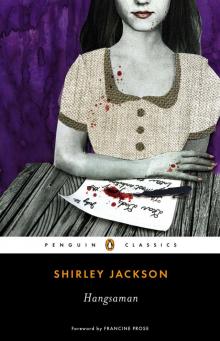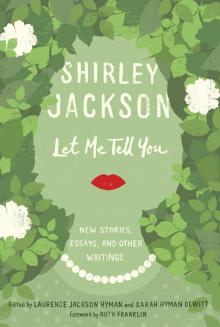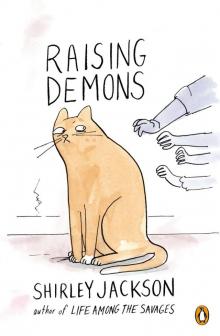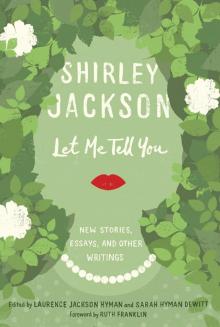- Home
- Shirley Jackson
Let Me Tell You: New Stories, Essays, and Other Writings Page 8
Let Me Tell You: New Stories, Essays, and Other Writings Read online
Page 8
“Aren’t I ever going to hear about anything but your work?” Mr. Arthur William Morgan looked at his wife irritably. “I’m tired of hearing about your work.”
“Not half as tired,” Mrs. Morgan said softly, stepping into the advantage, “as I am, sometimes.”
“All right,” her husband said. “So you’ve got a very important job and you’re a very important woman and everyone thinks you’re wonderful, and no one, not even your husband, is allowed to think any different. Except sometimes,” he added bitterly, “I get to wishing I had a wife who wasn’t quite so important and who stayed home sometimes and—”
“I suppose you wish you’d married someone else?” his wife asked, still using her same soft voice. “I suppose you wish you’d married—”
Their argument, begun in a familiar strain, went on in channels already so smoothly worn by years of bickering that neither of them bothered any longer to think about what they were saying. Mr. Morgan remarked that other wives found it possible to stay home and care for their homes and children; Mrs. Morgan pointed out that other wives did not have important, responsible positions. Mrs. Morgan added to this statement its usual corollary, which was that other wives did not have weak-kneed husbands who couldn’t take on half the responsibility their wives did. Mr. Morgan retorted that he personally didn’t see what was so damned important about Mrs. Morgan and her tiresome work except that it seemed to make Mrs. Morgan feel she had the right to tell everyone, Mr. Morgan in particular, what to do. Mrs. Morgan said that someone had to tell him. Mr. Morgan said that he was capable of taking care of himself. Mrs. Morgan said that she had never felt that subservience was necessary in a wife. Mr. Morgan said…Their voices went on and on.
In the kitchen, the new maid, her pocket full of candy and her eyes twinkling wickedly at some secret knowledge, listened first to the voices of the children as they drifted down from the open window of their room; when there was silence upstairs, she was forced to listen to the monotony of the argument going on between Mr. and Mrs. Morgan. After she had put the last dish away, given a final polish to the sink, and surveyed her new kitchen one last time to make sure that everything was in perfect order against the morning, the new maid smiled at the door behind which Mr. and Mrs. Morgan were bickering and went soundlessly upstairs to the room where the children slept in identical positions, as befitted twins. They had both kicked their blankets off, and she covered them. Andy said “Blugh?” inquiringly, and Anne answered him, “Mnh.”
Then the new maid, who had that day, by Mrs. Morgan’s authority, been given full charge of the children, the house, the cooking, the laundry, and presumably the mice in the pantry and the pumpkins in the garden, went soundlessly on her small feet to the room Mrs. Morgan had assigned her and where she had unpacked her belongings that afternoon. Much, much later, Mr. and Mrs. Morgan resolved their argument at the same point of mutual weariness at which it had been resolved so many times before, and went to bed.
In the morning, the sun rose as usual, and sent its usual impertinent rays to glitter on the eyelids of Mrs. Morgan. She opened her eyes, stirred uneasily, blinked, and sat up in bed. The room was full of sun, it was emphatically spring weather, and Mrs. Arthur William Morgan leaped out of bed with a firmness and resiliency she had not employed for a very long time. She slid expertly through the formality of washing, dressed quickly, not bothering with her shoelaces, gave her hair a civil pat with the brush, and ran downstairs. It’s morning, she was thinking, the sun is bright, the sky is blue, and I am hungry. She ran into the kitchen, and said, as she ran, “Can I please have a cookie?”
“No cookie,” said the new maid, looking severely at the plates she was setting onto the kitchen table. “Not before breakfast.”
“What’s for breakfast?” said Mrs. Morgan. “Can I have mine now, right away, quick?”
“You can have it when it’s ready,” said the new maid. “Not before.”
“But I’m hungry,” said Mrs. Morgan. “I’m starving.”
The new maid half smiled. She set a bowl of hot oatmeal down at one place, and beckoned with her head at Mrs. Morgan. “There you go,” she said.
Mrs. Morgan sat down, twisted her feet comfortably around the rungs of her chair, and said “Oatmeal? Oatmeal again?” She slid her napkin out of the ring and onto the floor, bent to retrieve it, and dropped her spoon. “I hate oatmeal,” she said. “I want to put my own sugar on.”
“You mind your manners,” said the new maid, “or you won’t have any sugar at all.”
Mrs. Morgan ate half her oatmeal in three spoonfuls, then lingered over the other half until it was clammy. She bit largely into a piece of toast, and broke the rest of the toast into small pieces, some of which she dropped into her fruit juice glass; some of them she hid inside her napkin ring. “Can I please be excused?” she asked finally.
The new maid looked down at the dish of oatmeal, sighed, and said, “Three more spoonfuls and you can run along.”
Mrs. Morgan dawdled over her three spoonfuls until she was excused without them, and then, free of the ritual of breakfast and possessed of a cookie, she ran out into the garden. She wandered for a while just looking; the grass was unbelievably green, the flowers just beginning to show color in the bright spring morning. The sky was so blue it hurt Mrs. Morgan’s eyes to look into it. When she looked up once, she saw a gray squirrel race happily up the trunk of the tallest tree in the garden; when he reached a high branch he stopped, looking curiously around and down at Mrs. Morgan, and winked his eyes at her amiably.
“Come on down, squirrel,” Mrs. Morgan said. She held out her hands and called to him, “Come on, come on. I’ll give you some peanuts,” she added winningly, but the gray squirrel only winked mockingly at her and ran on, up the tree and out of sight.
Mrs. Morgan went on undiscouraged through the garden; when she turned a corner of the path she saw, suddenly, a small boy staring back at her. For a minute they regarded each other soberly, and then the small boy said, “Who’re you? Think you’re big?”
Mrs. Morgan stood on one foot and swung the other back and forth. “I’m bigger’n you,” she pointed out. “I’m better’n you, too.”
“I’m smarter’n you,” the small boy said.
“I’m smarter’n you,” Mrs. Morgan said, “and I can boss you if I want to.”
“You can not,” said the little boy.
“Let’s play house,” suggested Mrs. Morgan. “I’ll be the daddy and you’ll be the mommy and I must come home from my office and you must be cooking dinner and I must say—”
“I don’t want to play house,” said the little boy. “I want to play army.”
“How do you play army?” said Mrs. Morgan.
“First I kill you and then you kill me,” said the little boy, reasonably.
“I don’t want to play that,” said Mrs. Morgan. “That’s a silly, silly game.”
“It is not,” said the little boy.
“It is so,” said Mrs. Morgan.
She turned and ran away, through the garden and back into the kitchen. “Can I have another cookie?” she asked.
After lunch she was tired and ready for a rest, but the minute she was put into her room with the shades drawn and the door closed she got out of bed and crept softly in her bare feet over to the dresser. There she opened all the jars and bottles of powder and cream and perfume; most of these she rubbed onto her face and into her hair. She carefully removed all of her clothes and then, as carefully, put them on again, but backward. Then she wriggled under the bed and played there until the new maid came and said she could get up from her rest. And, the new maid added, tightening her lips, Mrs. Morgan could just keep her clothes on backward for the rest of the day.
Later in the afternoon, as she played and danced among the flowers, Mrs. Morgan met the little boy again in the garden, and he yelled at her from a distance, “Nyah, nyah, youuuu can’t boss meeee.” She chased him, but he escaped her and stood behind a bush and jeered a
t her, as the squirrel capered above their heads in the late afternoon sunlight. Mrs. Morgan began to cry, finally, and ran away herself, into another part of the garden. It occurred to her that she could go into the house and ask for another cookie, but she had just turned the corner to the front steps when the sun, which had been meditating on this scene unnoticed for quite a while, went down.
Mrs. Morgan, her foot on the first of the steps, turned when she heard a sound behind her, and saw her husband.
“Evening, Agnes,” he said formally.
“Arthur,” Mrs. Morgan replied as formally. Together, in silence, they went up the steps to the front door. He held the door open for her and they went inside. In the living room the lamps were on, and Mrs. Morgan thought briefly how comfortable and warm it looked after the chill that had followed the sun’s setting. Then Mr. Morgan said, “Why, look at you. You’ve got everything on backward.”
“Well, you’ve got mud all over yourself,” she said angrily. After one more mutually disapproving glance, they turned their backs on each other.
“Dinner is served,” said the new maid, from the doorway.
Mrs. Morgan sat down at the table, looked deeply into her bowl of consommé, and said, “Heavens, I’m tired.”
“So am I,” said her husband, as though the fact surprised him.
“What do you do all day?” asked Mrs. Morgan maliciously. “I mean, to get so tired?”
“More than you do.” His voice rose to its familiar argumentative tone. “If you think—” he began.
“I think,” Mrs. Morgan cut in smoothly, “that you are speaking to me as though I were one of your secretaries or some such thing. Remember,” she pointed out icily, “you are not my—” She stopped abruptly.
“Well, you can’t boss—” he began, and then he, too, stopped speaking. His face went crimson, and Mrs. Morgan, her own face reddening, stared back at him. “You can’t boss me,” he finished weakly. His mouth stayed open as he stared at his wife.
“You,” Mrs. Morgan said helplessly, “can’t boss me,” and then they both began to laugh, guiltily at first, and unwilling to look at each other, but then, finally, holding on to each other weakly while the tears rolled down their cheeks, until they were no longer able to laugh out loud but could only gasp.
“Arthur,” Mrs. Morgan said finally, barely able to speak. “Oh, Arthur.”
Mr. Morgan wiped his eyes with the back of his hand. “And your clothes!” he said, “Agnes, your clothes!” Together they burst into laughter again.
The new maid, peering through the swinging door between the dining room and the kitchen, watched the couple for a quick minute, and then, grinning, returned to her dishwashing. From upstairs, the voices of the children drifted down to her through the open windows.
“And when you’re right on top, in the little tiny branches”—Andy’s voice rose—“you can swing, and hold on tight, and swing way out over the ground!”
Anne giggled softly. “I had five cookie crumbs and a grape,” she said. “You know the little cups in the little tiny china closet? Well, they leak. Everything leaks out of the bottoms of them. And the beds look soft, but really they’re not.”
“And the ground looks so far far far away,” Andy went on dreamily, “and you have to hold on tight.”
“And I rode on the little fire engine,” Anne said. “She wound it up for me and I rode around and around and around the playroom, and it’s miles and miles and miles…” Her voice faded.
“Swinging back and forth, up in the sky,” Andy said. His voice softened abruptly. “Up in the sky,” he said once more, and then all was quiet.
The new maid finished her washing, took the untouched soup bowls off the table in the dining room, and glanced into the living room, where Mr. and Mrs. Morgan sat on the couch holding hands and talking earnestly, and still laughing occasionally.
When the kitchen was clean and tidy, the new maid took off her apron and hung it up with a sigh. She went upstairs soundlessly, stopping at the room where Anne and Andy slept in identical positions. When she covered them, Anne said “Graa?” inquiringly, and Andy reassured her, “Wssh.”
Then the new maid went back downstairs, still without sound on her small feet, to the room Mrs. Morgan had assigned her and, stopping now and then to smile wickedly to herself, began to pack.
French Is the Mark of a Lady
She came in very quietly, standing in the darkness of the huge polished room until I noticed her. She was very small, and her dark curls were tied up in a red bow. When she walked, the bow shook back and forth on her head.
“Hello,” I said to her politely.
“What do you want here?” she asked.
“I’ve come to see your mama.”
“My mother”—the emphasis was very marked—“is still dressing.”
“I know. I’m waiting for her.”
“Have you come about a charity?”
“No. I used to know your mother a long time ago, and now I’ve come to see her.”
“Did she invite you?”
“No.”
The red bow shook vigorously. “My mother doesn’t talk to people unless she invites them here.”
I was annoyed. “Nevertheless, I strongly suspect that your mother will be down to see me in a minute.”
“Oh.” Large dark eyes regarded me steadily. “Why do you want to see my mother?”
“I used to know her a long time ago.”
“How long?”
“Oh…ten years. Before you were born.”
“I’m eight.”
“I’ve known your mother since she was a little girl.”
The topic seemed to bore my companion. She stood perfectly still, her eyes looking over my shoulder. When I finished speaking, she looked at me again and said: “I’ve got a boyfriend.”
I didn’t laugh. “Aren’t you rather young?” I asked.
“No.”
I tried again. “What’s his name?”
“John. He drives a car.”
“How old is he?” I was a little startled.
“Thirty-three.” She nodded vigorously. “He drives me around.”
“That’s very convenient.”
“I need someone to drive me around,” she said, looking at me.
“Where do you have to go?”
“Everywhere.” She made a vague gesture with her hand. “I have to go around everywhere.”
A sudden thought struck me. “I suppose you have a great deal of charity work to do, like your mother.”
Her voice took on a heavy lifelessness. “It’s such a bore,” she sighed.
“But tell me about your boyfriend,” I said. “What else does he do besides drive you around?”
“He delivers ice,” she said.
I kept my face sober. “That must be very interesting.”
“Sometimes it is,” she said. “Sometimes it’s inconsistent.”
I thought. “Do you mean inconvenient?” I asked.
“Inconsistent,” she said firmly.
“Oh. Well, are you going to marry your boyfriend?”
“What?” she said blankly.
“No. Well…what does your mother think of him?”
“She thinks it’s good for me.”
“What, your having a boyfriend?”
“She says she used to ride on ice wagons when she was a girl.”
“She did,” I said. “I used to ride on them with her. But I don’t recall our having any boyfriends among the drivers. We always felt that they were a little…well…old. I recall that we preferred younger men…say, the boys we met in school.”
“They’re so puerile,” she said.
I jumped. “I suppose they are,” I said faintly.
“It’s nice having a man around,” she added.
“Has your mother met him?”
“No,” she said, looking at me. “You don’t deliver ice to the front door.”
“Where do you go to school?” I asked desper
ately.
“I go to a private school,” she said. Her voice took on that lifelessness again. “School is such a bore,” she said.
“What do you learn there?”
“French. And music.”
“Do you like French? I remember I used to hate it, in college.”
She looked at me severely. “French is the mark of a true lady.”
“Your mother doesn’t speak French. Is she a true lady?”
“My mother does so speak French. She learned when we were in Paris after her divorce. She said she would have to know a few words anyway. You don’t need more than that.”
“And music?” I said.
The opening of the door interrupted her, and we both turned to see her mother entering. The little girl held out her hand to me, and I shook it weakly, and then, smiling at her mother, she went to the door, stopping to say: “Mother, this lady and I have had such a nice chat, while we were waiting for you.” Then she smiled again at me, and closed the door quietly behind her.
“Such a sweet child,” I said.
“And so clever, too,” murmured her mother. And then to me, gaily: “But, you, my dear! How are you?”
Gaudeamus Igitur
Although she went first of all to the hill beyond the old cemetery, it was too wet to sit on the ground and there were children walking sedately up the hill in a long line, following one another in solemn procession; five of them. She put her scarf on a rock and sat down, realizing it would be difficult to sit there for even as much as the few minutes she owed the hill, seeing already as she sat down the uneasy perching, her feet braced in the mud, and the ungraceful rising, with the hem of her dress caught in the grass, her self-conscious duty completed, nothing solved.
I’ve got to think, she had told herself; decide what to do. Go somewhere and sit down quietly and think sweetly and logically and come home at peace. Not, however, on this wet, windy hill with children eyeing her cautiously in a long row against the sky. Five of them, three boys and a girl and a small, unidentifiable one; she disliked getting up from the rock while they watched her.

 The Road Through the Wall
The Road Through the Wall Hangsaman
Hangsaman Come Along With Me
Come Along With Me The Lottery
The Lottery Just an Ordinary Day: Stories
Just an Ordinary Day: Stories The Sundial
The Sundial Dark Tales
Dark Tales Let Me Tell You: New Stories, Essays, and Other Writings
Let Me Tell You: New Stories, Essays, and Other Writings The Haunting of Hill House
The Haunting of Hill House The Bird's Nest
The Bird's Nest Raising Demons
Raising Demons We Have Always Lived in the Castle
We Have Always Lived in the Castle The Letters of Shirley Jackson
The Letters of Shirley Jackson The Missing Girl
The Missing Girl Let Me Tell You
Let Me Tell You